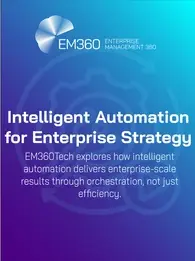
Enterprises are increasingly adopting artificial intelligence (AI) and integrating the technology into their own operations. As a result, the tech industry now boasts a diverse AI ecosystem around the world.
Earlier this year, a collective of industry experts gathered at the US-China AI Tech Summit in Silicon Valley to discuss the future of enterprise AI. A new report published in collaboration with The Future Society details the proceedings from the event.
The panel included the likes of Howie Xu (Founder & CEO, TrustPath), Joy Tang (Founder & CEO, Markable.AI), and Terry Song (Managing Director, JD Capital). Julie Choi (Head of AI Marketing, Intel), Shaun Paga (VP of Sales at Soul Machines), and Anis Uzzaman (General Partner, Fenox Venture Capital) also contributed.
Startups and large enterprises face different challenges
The first key takeaway from the report is that enterprises and startups occupy different roles in the AI economy. "As companies' scale, scope and time in business differ, so do their strengths and weaknesses," the report read.
On the one hand, AI has increased competition between startups and enterprises. However, the opportunities and challenges in the race to become AI-enabled differ greatly between companies.
AI startups benefit from focus and collaboration
AI focused startups are far more agile than their enterprise counterparts. Niche companies are apparently far more accurate, which in turn enables startups to become more advanced.
In order to solve problems, "AI startups develop symbiotic relationships" with small, medium and large enterprise clients. In this parternship, startups exchange their models (SDK and API) in exchange for the enterprise's data.
As a result, enterprises can reduce their technology development time and startups are able to receive a vast amount of diverse data. "As we know for AI, training data is like our fuel to the car, like the blood source," CEO of Markable.AI Joy Tang insisted.
AI talent is scarce
Despite the obvious benefits that AI can bring, the sector lacks employees with advanced skill sets. Companies require advanced data scientists, developers and engineers in order to develop and manage AI technology.
Subsequently, "businesses compete against each other for talented and qualified employees" in the industry. Talent recruitment and retention is therefore integral to AI in the enterprise.
AI talent initiatives on the rise
Some companies and governments are now beginning to launch initiatives in order to rectify the shortage of AI-related skills. Earlier this month, Microsoft announced that it would be launching two new training programs to boost AI skills in the UK.
In addition, Intel Ireland has unveiled plans to initiate an incubator programme at Talent Garden in Dublin City University. The space also encourages co-working, digital training, and networking in the heart of Dublin City University's innovation campus, DCU Alpha.
The UK government has also dedicated up to £50 million to develop world leading AI talent in the country. DCMS Secretary of State Jeremy Wright said that “the investment will help us to recruit and retain the best talent in AI.”













Comments ( 0 )